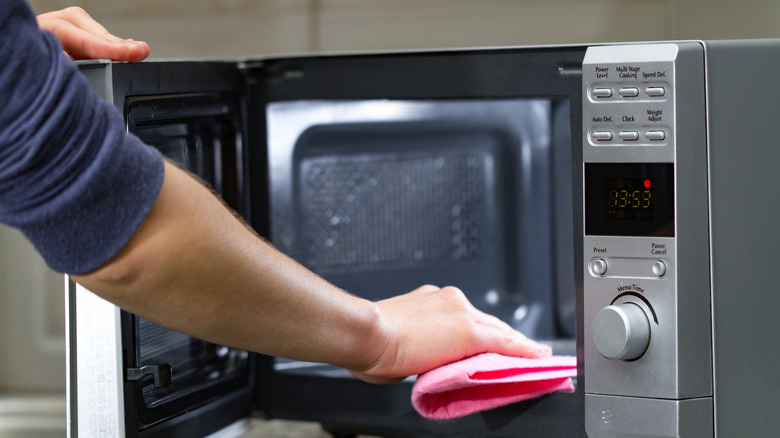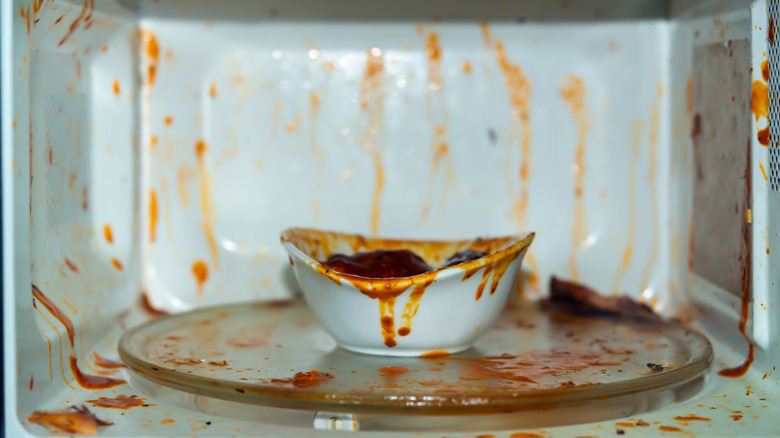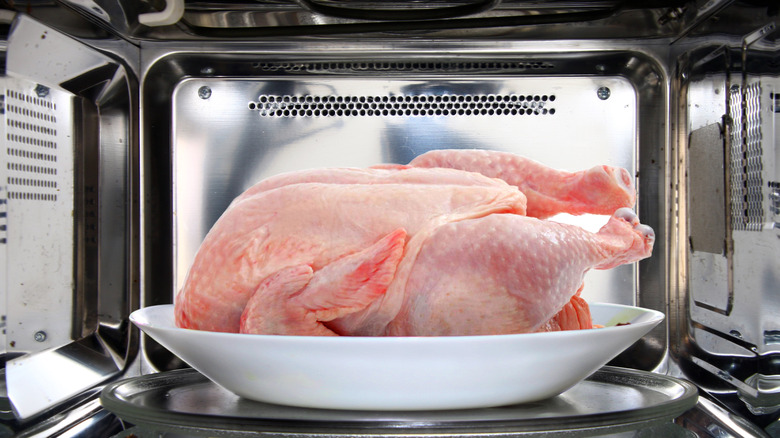Can A Dirty Microwave Make You Sick?
Let's face it, not many people actually enjoy cleaning. Sure, there is a sense of satisfaction that comes with having cleaned. Once finished, you can survey your living space and feel more peaceful and organized with everything is in its place (via Real Simple). You may also feel thoroughly accomplished if you've let things go for a while. In fact, cleaning can be used as a form of meditation when stressed, so by the time you're done, you feel a little more relaxed.
Still, for the majority of us, cleaning is a necessary evil that honestly just needs to get done. The kitchen is one of the most highly trafficked as well as bacteria-laden rooms. You might assume the bathroom would win out, but with the preparation of food, the kitchen becomes a breeding ground for germs as well. According to Food & Wine, it may even be "dirtier than a toilet seat." Let that sink in a bit.
When thinking of keeping the kitchen clean, we naturally gravitate toward the sink and the counter where we do most of our meal prep. Then, it's probably the fridge and the stove, but how often do you clean your microwave? Here's why regularly cleaning your microwave is important.
What happens when a microwave gets dirty?
With repeated use, it's inevitable that your microwave will get dirty. Food heated in a microwave can splatter and get into all crevices along the top, bottom, and sides. When you take food out, you are more than likely to eat or serve it and tell yourself you'll go back and clean your microwave once the meal is over. However, that is an easy thing to forget, and once food dries up in a microwave, it can become stuck and more difficult to get out.
Yet, more troublesome is the fact that food that gets left in a microwave has the potential to grow bacteria. The warmth and moisture combination creates a breeding ground for germs to grow and multiply (via Rise and Shine Cleaning).
Still, the worst part is what can happen if the food residue that is splattered on top, dries, and gets stuck (via Vice). Then, when you go to use the microwave the next time, once it heats up, it may cause the old food remnants to moisten up and fall right into the food you're currently making.
Defrosting meat calls for immediate clean-up
Another thing to consider is when you defrost frozen raw meat. Any residual meat juice needs to be cleaned up and disinfected right away. Raw meat can contain E coli, salmonella or listeria and cause severe food poisoning and infection (via Centers for Disease Control and Prevention). In addition, there is no research supporting the idea that when you use the microwave you nuke the existing germs (via Scientific Reports). Simply using the microwave does not kill bacteria.
Ironically, the dirtiest part of the microwave may not even be the inside. The handle is by far dirtier. According to Forbes, in a study done in office settings, 48% of microwave handles were found to be contaminated with bacteria.
Given all the potential for germs and bacteria, regular cleaning is essential. Home Made Simple recommends a few trusty items to help get your microwave spotless, including baking soda, olive oil, lemon, vinegar, Mr. Clean Magic Eraser, and a good dish soap. Although, it's ideal to clean up after each use, that's not always possible so the bare minimum should be once a week.



